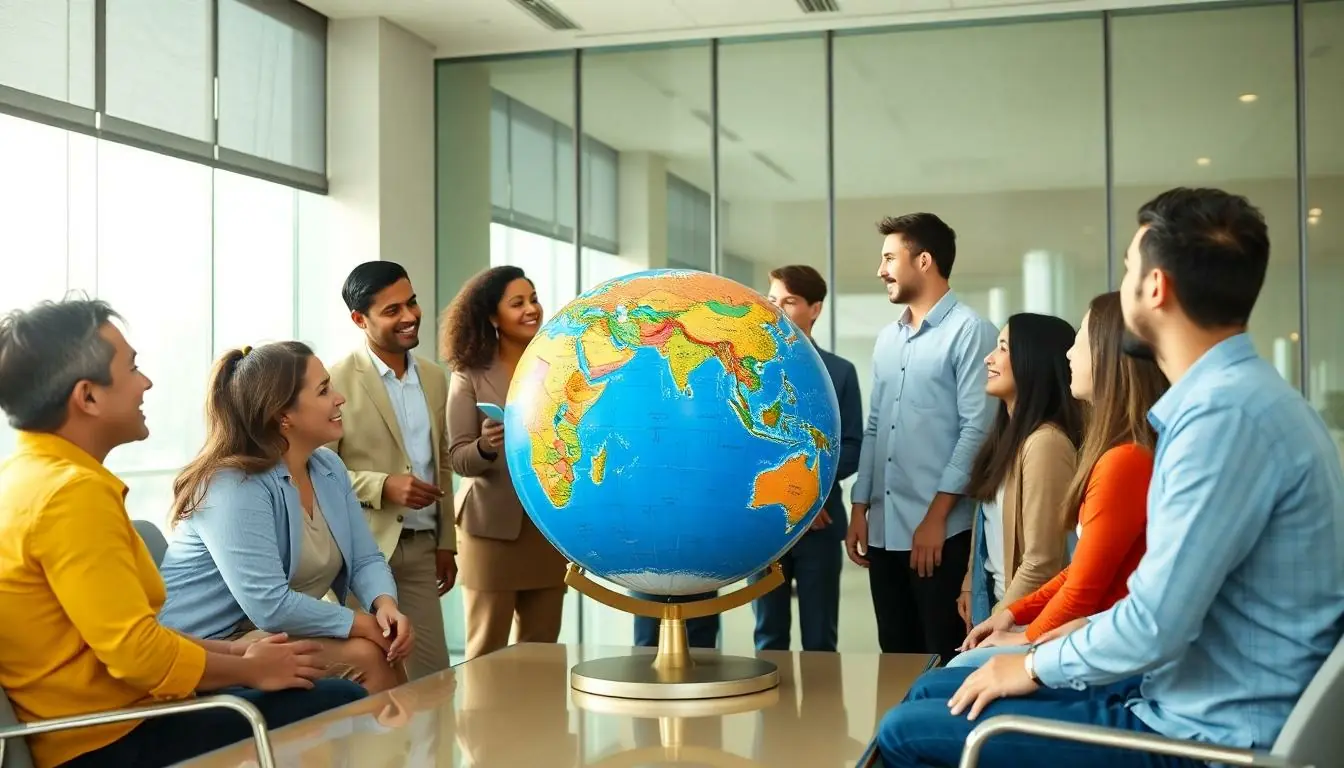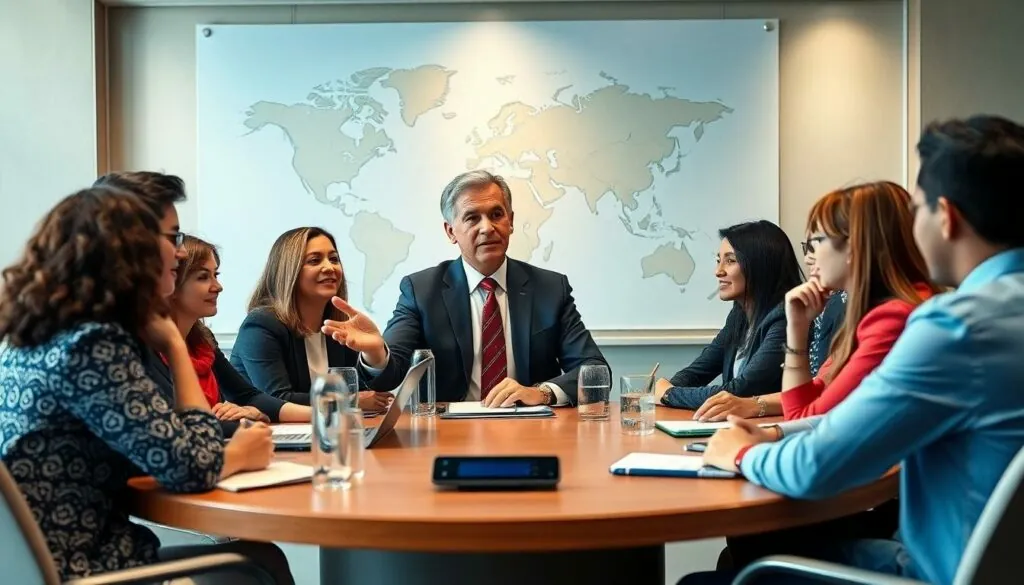Table of Contents
ToggleGlobal affairs might sound like a fancy term reserved for diplomats sipping espresso in posh cafes, but it’s much more than that. It’s the intricate web of relationships and events that shape our world, from trade deals to climate change. If you’ve ever wondered how a tiny tweet can send shockwaves through international markets or how a global pandemic can change the way we interact, you’re already on the right track.
Understanding Global Affairs
Global affairs represent an intricate web of relationships and interactions shaping international dynamics. These interactions span various sectors, influencing nations and global societies.
Definition of Global Affairs
Global affairs encompass the study of interconnected political, economic, social, and environmental factors. They include not only international relations but also trade agreements, conflict resolutions, and cooperation efforts. Entities involved often range from governments to multinational corporations and non-governmental organizations. Understanding global affairs highlights how domestic events can reverberate across borders, impacting global stability and prosperity.
Importance of Global Affairs
Global affairs play a crucial role in understanding the world today. They foster cooperation between nations, enabling collective solutions to global issues like climate change and health crises. Through effective global governance, countries can address challenges such as poverty, inequality, and terrorism. The interconnected nature of global affairs affects economic stability and peace, marking its significance in fostering diplomatic relations. Awareness of this importance equips individuals and organizations to navigate the complexities of an increasingly globalized world.
Key Areas of Global Affairs

Global affairs encompass several critical areas that shape international dynamics. Understanding these areas aids in grasping the complexities of the world stage.
International Relations
International relations study the interactions between countries. It involves diplomacy, conflict resolution, and trade negotiations. The role of organizations like the United Nations is significant in maintaining global peace and security. They facilitate discussions on issues that arise between nations. Non-state actors, such as multinational corporations and NGOs, also influence decisions on the international level. These interactions impact global stability and collaboration.
Economic Globalization
Economic globalization refers to the increasing interdependence of economies worldwide. Trade agreements, such as NAFTA and the EU, demonstrate this interconnectedness. Nations participate in global supply chains, enhancing economic efficiency. Currency exchange rates fluctuate based on international market conditions. Developing countries seek trade partnerships to boost their economies. Economic policies implemented by one nation can significantly affect others, thus creating a global economic landscape.
Environmental Issues
Environmental issues highlight the necessity of global cooperation to tackle climate change. Pollution and resource depletion affect all nations, regardless of geography. Climate agreements, like the Paris Accord, aim to unify efforts in reducing greenhouse gas emissions. Biodiversity loss poses threats to ecosystems and human health. Nations increasingly recognize that collective action is vital for sustainability. Collaboration on environmental initiatives facilitates shared resources and technology transfer.
Human Rights
Human rights emphasize the fundamental rights and freedoms inherent to all individuals. Organizations like Amnesty International advocate for the protection of these rights globally. Governments are held accountable for upholding international human rights treaties. Issues such as inequality, discrimination, and freedom of expression remain pressing challenges in various countries. Investigations into human rights abuses spark international responses and campaigns. Ongoing dialogue and advocacy are essential for promoting human dignity across the globe.
The Role of International Organizations
International organizations play a crucial role in managing global affairs, mediating international conflicts, and promoting cooperation among nations.
United Nations
The United Nations (UN) focuses on maintaining international peace and security. Founded in 1945, it provides a platform for dialogue among 193 member states. Peacekeeping missions, humanitarian aid, and the promotion of human rights form the core of its activities. Additionally, UN agencies like UNICEF and WHO tackle issues such as child welfare and global health crises, emphasizing the interconnectedness of nations.
World Trade Organization
The World Trade Organization (WTO) facilitates international trade by establishing legal frameworks and resolving disputes. Operating since 1995, it creates rules that govern trade between member countries, promoting fair competition. Trade agreements influence economic policies worldwide, impacting tariffs, subsidies, and market access. Enhanced global trade relations contribute to economic growth, making the WTO integral to economic globalization.
Non-Governmental Organizations
Non-governmental organizations (NGOs) significantly contribute to global affairs by addressing social issues, humanitarian needs, and environmental challenges. NGOs operate independently from governments, focused on advocacy and service delivery. They mobilize resources, raise awareness, and influence policies on critical matters like climate change, health, and education. Collaboration between NGOs and international organizations strengthens efforts to tackle pressing global issues effectively.
Current Trends in Global Affairs
Global affairs reflect ongoing dynamics that shape international relationships. Increasingly, these trends are influenced by various factors that require attention.
Geopolitical Tensions
Tensions among major powers dominate geopolitical discussions. Hefty tariffs and trade disputes often arise, leading to economic repercussions. Escalating military conflicts in regions like the South China Sea heighten global uncertainty. Sanctions and diplomatic standoffs between countries signal strained relationships. Nations are increasingly investing in military capabilities, changing security dynamics worldwide. Collaboration among alliances, such as NATO, shows attempts to counterbalance aggressive actions.
Climate Change Initiatives
Climate change initiatives gain momentum across nations. Many countries commit to net-zero emissions targets, aiming for sustainable practices. International agreements like the Paris Accord remain critical in guiding collective efforts. Renewable energy projects are on the rise, as governments seek alternatives to fossil fuels. Local communities engage in conservation initiatives, emphasizing grassroots actions to combat climate change. Investments in green technologies foster innovations and economic growth.
Global Health Challenges
Global health challenges draw attention from leaders worldwide. Pandemics like COVID-19 expose weaknesses in health systems, prompting urgent reforms. Vaccination campaigns play a crucial role in achieving herd immunity globally. Collaboration between countries becomes essential in sharing resources and knowledge to manage health crises. Access to healthcare remains a significant issue, highlighting disparities among nations. Enhanced global cooperation in health initiatives fosters resilience against future threats.
Understanding global affairs is essential for navigating today’s interconnected world. The intricate web of political, economic, social, and environmental factors shapes international relations and influences everyday lives. As nations face challenges like climate change and health crises, cooperation and dialogue become increasingly vital.
The role of international organizations and NGOs in fostering collaboration cannot be overstated. Their efforts in conflict resolution and humanitarian aid play a crucial part in promoting peace and stability. As global dynamics continue to evolve, staying informed about these affairs empowers individuals and organizations to contribute effectively to a more sustainable and equitable future.







